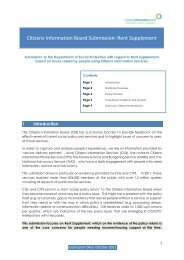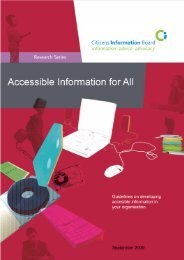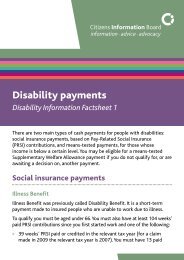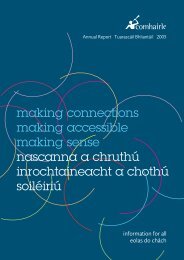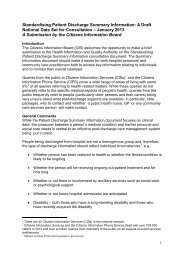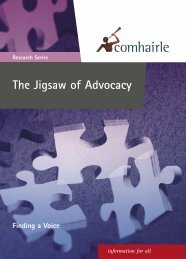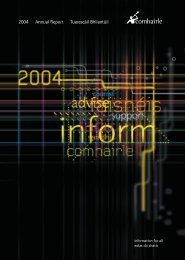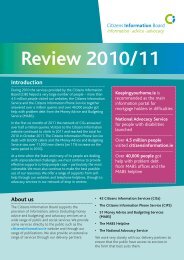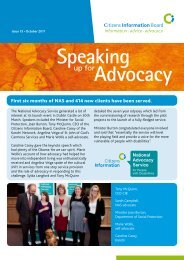Review of Sign Language Interpretation Services and Service ...
Review of Sign Language Interpretation Services and Service ...
Review of Sign Language Interpretation Services and Service ...
- No tags were found...
You also want an ePaper? Increase the reach of your titles
YUMPU automatically turns print PDFs into web optimized ePapers that Google loves.
7.2.3 How the future service model builds on the key positive aspects<strong>and</strong> addresses the areas for improvement in current SLI service provisionThe proposed future service model for SLI services in Irel<strong>and</strong> draws on lessonslearned from best practice internationally <strong>and</strong> key messages from the consultationprocess. It endeavours to build on what is currently working well in Irel<strong>and</strong>, whilstaddressing the areas for improvement identified as part <strong>of</strong> this review.The following two tables summarise the positive aspects <strong>and</strong> the areas forimprovement in the current provision <strong>of</strong> SLI services in Irel<strong>and</strong>, which are relevantto this review, <strong>and</strong> describe how these elements would be built on or addressedto support an effective future SLI service.Table 7.1. Key positive aspects <strong>of</strong> SLI services in Irel<strong>and</strong> <strong>and</strong> how theywill be built uponKey positive aspects <strong>of</strong>SLI services in Irel<strong>and</strong>Co-ordinated accessto interpreters throughone central nationalagencyIncreasing awareness<strong>of</strong> the existence <strong>of</strong> aSLI service among allstakeholdersThere is a willingnessto explore technologywhich can support thedevelopment <strong>of</strong> SLIservicesPersonalised serviceHow the future service model could build onthis areaHaving one agency for anyone wishing to book SLI servicesis regarded as a positive arrangement. It makes for ease <strong>of</strong>booking with one organisation to contact. This positiveaspect <strong>of</strong> the current system should be maintained goingforward <strong>and</strong> a central booking service should have a key roleto play in future service provision.Increasing awareness is obviously seen to be a positiveadvancement. The future service model should support thedevelopment <strong>and</strong> promotion <strong>of</strong> SLI services, through, forexample, awareness building campaigns targeting both theDeaf community <strong>and</strong> public service providers.This appetite for technology should be harnessed, <strong>and</strong> anational remote interpreting service developed. In the futureservice model, technology would be implemented tocomplement face-to-face interpreting, facilitate access to SLIservices in rural areas <strong>and</strong> make efficient use <strong>of</strong> interpreters’time to support increased service delivery.The current SLI service is quite personalised by virtue <strong>of</strong> thefact that there is a limited number <strong>of</strong> interpreters <strong>and</strong> there isone central national agency through which most peopleaccess SLI services. There is no reason why the personalnature <strong>of</strong> the service should change. It is intended that thenew entity, i.e. the Irish <strong>Sign</strong> <strong>Language</strong> <strong>Interpretation</strong><strong>Service</strong>, should have a comprehensive website with details<strong>of</strong> all the interpreters with whom it works.<strong>Review</strong> <strong>of</strong> <strong>Sign</strong> <strong>Language</strong> <strong>Interpretation</strong> <strong><strong>Service</strong>s</strong> <strong>and</strong> <strong>Service</strong> Requirements in Irel<strong>and</strong> • page 119



